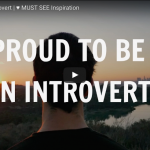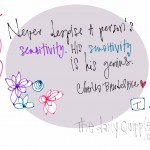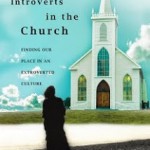While some of the traits associated with introversion and autism occasionally overlap, the two are very different. So, understanding the differences between the two is incredibly important!
There’s a common misconception that introversion and autism are intrinsically linked with one another. On the contrary, the two are completely independent of one another. Put simply, autism is best described as a neurodevelopmental disorder, while introversion is an individual quality of being shy and reserved.
Recognizing the signs of introversion, as opposed to autism, is incredibly important, especially when it comes to young children. Whilst having an introverted personality doesn’t have a major impact on a child’s growth and development, being autistic certainly can. That’s why children who are diagnosed with autism often require additional support, including things like custom learning plans and psychiatric service dogs. Parents also need to become well versed in special educational needs law.
In this post, we’ll be covering the details of both introversion and autism, taking a look at the traits commonly associated with both. Be sure to keep reading to find out more!
What is Introversion?
As we touched on earlier, introversion is the quality of being shy or reserved. It’s a personality trait that’s focused on being more comfortable with internal feelings rather than external stimulation.
Introversion is generally seen as being along a continuum with extroversion. As the name suggests, extroversion represents the complete opposite of introversion, that being the qualities of being outgoing and outspoken.
Exploring the nuances of introversion and extroversion can be a fascinating field of study, and it opens up a world of job opportunities for psychologists specializing in personality research and analysis.
Common Signs of Introversion
So, now we know what introversion is, how might someone spot if their child, or anyone else for that matter, is introverted? Let’s take a look…
Struggling in Group Settings
Group settings can often be a little overwhelming for introverts. When someone is made to socialise or complete an activity with others, you may spot that they quickly go into their shell and hesitate to contribute.
That’s especially the case in situations where an introverted person is completing group work with strangers, or classmates they aren’t familiar with.
Changes to Personality in Different Situations
It might be the case that someone’s general personality changes dramatically in different situations. For example, a child might be incredibly vibrant and talkative when they’re in their home environment, but becomes very quiet and hesitant when they’re in school or playing with other children.
When a child’s personality changes depending in the environment, they find themselves in, this could be sign that they have a more introverted personality.
Can Become Absorbed in Solo Play
Play time is incredibly important for children’s general development. As a parent, you’ll know that you can choose to engage in collaborative play with your children while they’re at home, or you can leave them to play by themselves. Some children struggle to engage in play if they’re by themselves, while others tend to thrive.
Those that find it very easy to engage in solo play, or take themselves off to play, or carry out an activity like reading or drawing by themselves, may well be introverted.
What is Autism?
So, we’ve got a better idea of what introversion is? But what about autism? Well, that’s where things can get a little trickier to precisely pin down.
Autism, or autism spectrum disorder (ASD), refers to a wide range of different conditions. They are generally characterized by difficulties with social skills, behaviour, speech and nonverbal communication.
There is no one type of autism. Rather, there are a number of different subtypes, most of which are strongly influenced by a combination of genetic and environmental factors.
Autism is also considered to be a ‘spectrum disorder’. This means that individuals who are diagnosed with autism have a distinct set of strengths and challenges. Some people with autism may be highly skilled at learning and solving problems, while others may experience severe challenges.
Common Signs of Autism
Spotting signs of autism is challenging, given how many different subtypes there are, but it is possible. They may exhibit:
A Lack of General Social Skills
A child with autism may have a difficult time interacting with others, both their own age and older. This doesn’t necessarily mean that the child is introverted and doesn’t like speaking to others; there are a range of different social difficulties that could be on display.
For example, a child with autism may not respond to their name, avoid eye contact, struggle with empathy, and find it difficult to properly comprehend their own emotions.
Behavioural Issues
Autism can have a profound effect on someone’s behavioural patterns. This doesn’t explicitly mean that someone behaves poorly; it means that their behaviour falls outside what would be expected of someone the same age.
Someone with autism might frequently exhibit repetitive behaviours, have specific routines that they want to follow, have fussy eating habits, or act on impulse. Someone with autism might demonstrate one of these signs, or a combination. Every child is very different.
Difficulties with Communication
It’s been found that children with autism have difficulties with communication, whether its verbal or nonverbal in nature. That could mean hitting communicative milestones much later than expected. Or, in serious cases, failing to develop any sort of communicative awareness whatsoever.
There are a number of other more intricate signs to be aware of with regards to communication problems in autistic children. For example, autistic children might struggle with more nuanced language features, such as sarcasm or jokes, or they may exhibit echolalia (repeating the same phrase over and over).
Are You Questioning Whether Your Child is Introverted or Autistic?
In this post, we’ve taken an in-depth look at what it means to be introverted and autistic, as well as covering some of the common signs that are associated with both. It’s certainly true that someone can be both, but the two shouldn’t terms shouldn’t be used interchangeably.
Have you got any more questions regarding introversion or autism? Or perhaps you have some tips related to caring for an introverted or autistic child? Feel free to leave a comment below so we can keep the discussion going!











I have high functioning autism and I also consider myself to be an introverted thinker. But I’m an extroverted intuitive.
I’m very good at reading people’s motives. This is extroverted intuition at work.
Would say I used to be an INTP which is a nerdy left brained type with an aptitude for math and science.
Today I’m an INFP as I have placed more importance on emotion and I’ve become more well rounded.
As someone on the spectrum I have been able to learn empathy and communication skills by modelling behaviour of people who have social success.
Autism and introversion go hand in hand. What I will say is that most Autists are introverted. All my clients on the spectrum were introverted more so than extroverted.
Introverts have higher amounts of genius and mental health issues as well.
As an introvert I feel like 3 people is a crowd.
I love this website the authors here make great content.
I would love to write some guest posts here and share more insights about introversion.
Angus
Alas, the break-down of Autism in this article is very much based on male-only models and out-of-date biases. If an author is still citing “lack of empathy,” they are running off very old and harmful “information.” Those on the Spectrum tend to be as or more empathic than neurotypicals (NTs). See the Autistic Not Weird website and even the BBC’s more recent descriptions, e.g., “They may also have trouble expressing their feelings in a conventional way. But they can be more empathetic or emotionally aware than non-autistic people.”
Also missing here is any discussion of or understanding for how Autism manifests in females, which tends to follow a different trajectory that the stereotypical “model.” Females are conditioned to camouflage from an early age and may “pass” as NT at very high psychological costs. Creativity and high levels of imagination, as well as empathy including deep connections with animals, are not unusual for females on the Spectrum.
I am an introvert and I am also an Aspie woman. The two are different, yes. At first, it was very validating to know that I am an Introvert, but later learning that I am Autistic has given me important and ultimately positive understandings I would never have had otherwise. I feel that this article is written by someone from the outside, who is not on the Spectrum. As we say, “Nothing About Us Without Us.” Unfortunately, it seems to me that this article is very much “Without Us.” I strongly suggest better research and the inclusion of Autistic voices if you wish to truly have any meaningful or fair discussion about the differences between Autism and Introversion.
I very much agree.
Word 💝
I won’t speak out about Autism, because I’m not experienced in this field. However, some traits that you showed as introvert traits are hurtful. Introversion DOES NOT mean shyness. Sure, the two are correlated and go hand by hand, but not always. I’ve met talkative, outgoing introverts and shy, quiet extroverts. Introversion just means we tend to be overstimulated easily by sounds, lights and other ouside stimuli (so 3 IS a crowd). We drain our battery when with people and we recharge it going solo. There is nothing wrong with that and you made it look like we are those weird people who won’t speak to people when you showed “differences” between introvert and extroverts.
So, in a “3 is a crowd” situation, at what point do you feel the need to remove yourself to “recharge”? Do you see yourself slowly removing from the situation or is it very abrupt? Are you able to feel empathy for the others & consequently the understanding that such behavior may be perceived by them as rude? Does it bother you that you might be perceived as rude and/or anti-social?
I am definitely an introvert but have not been diagnosed as autistic (however I do have some characteristics that make me wonder, which is how I got here). I am definitely very worried about how others feel and about seeming rude or not social. It’s kind of a growing need to get away… kind of like if socializing were drinking water, and needing to go recharge is like the need to eventually go use the restroom. Social situations that are more off-putting are like drinking a whole bunch at once, which will sort of create the need to get away sooner. I don’t know if that makes sense. People talk about batteries- social interaction drains an introvert’s batteries. More difficult interactions drain the batteries faster. The batteries recharge on their own, but only when no one is around to drain them. Extroverts, on the other hand, feel energized by social interactions. But it’s not that I don’t feel good after having an evening of positive interaction with friends. I’m just tired. It’s like being tired after going to an amusement park or something. But I’m still tired, even though I wanted to be there and enjoyed it. I may feel energized in a way but I’m ready to go home. If it’s a bad time- a party where I don’t know anyone, for example, it’s more like the sort of tired you get after a long crappy day at work where everything went wrong. I don’t want to even think about other people for a couple of days then because it’s like your energy has been stolen from you in a bad way. Introverts have limited social energy and that’s why they ration it and may sometimes seem selfish with their time or “anti-social.” If an introvert wants to spend time with you, it means they enjoy being around you. Sometimes it seems to me that an extrovert would spend time with anyone just to not be alone. A lot of articles I’ve read say introverts aren’t judging you but we often are. We think extroverts are silly and noisy and sometimes wish they would just go away and stop draining our energy. But we like people- we are not anti-social, we are just selective about our activities and the people we spend time with, out of necessity, because we do crave social contact, just on our terms.
Damn reading this made me feel a little better, this article was way to pointed towards a parent reading it and I was looking at is for myself because I am introverted but I also have a few symptoms that could potentially point to me being on the spectrum. And it doesn’t really do a good job of that and as was pointed out by a few people it doesn’t talk much about how gender makes a difference. I kinda wonder if you ended up being diagnosed because I am wondering if I should. My mum has been a disability support worker and has worked with many autistic people so I never really thought I could be autistic until my sister randomly said it and my mum made a joke about it while somewhat drunk when I mentioned that my sister thought I could be autistic “I’m sorry you had to find out this way” it was obviously a joke and I knew it at the time but it was very insensitive to my inner struggles at the time and caused me to go cry in my room. Anyway I talked to her again and she said I wasn’t autistic and that helped for a while cos I’m like – she’s worked with enough autistic people, she should know what she’s talking about – but well, here I am, back to trying to figure out with I’m autistic/neurodivergent or introverted and the slightly autistic stuff is just my personality or smth. Ngl I’m not having a great time wondering if it’s me or neurodivergence that makes me like this…. Which is a really unhealthy way to look at it but idk how to stop. Anyway idk why I’m still typing I’m not gonna get a reply.
Although I’m not the OP on the comment, I very much agree that introversion and shyness are NOT the same thing. I believe shyness has a component of fear, whereas many introverts are just conserving their energy.
To respond to the question Conjetta Huck asked a couple different commenters, I would ask how do you know when you’re thirsty, or how do you know when to go to sleep? Your body tells you, and you can feel it coming. Also, you know you need water and you know you need sleep, so you plan for it throughout the day to make sure you get enough. Sometimes you get wrapped in activities and suddenly realize how thirsty you are or how sleepy you are, but if you were listening to your body, you would know. Same goes for introverts needing to recharge. I know I need alone time to charge for “peopling” (as I call it), and if I can’t make that time for myself, I know I’ll be exhausted more quickly. Removing myself from a situation doesn’t have to be abrupt, and every social encounter has to end sometime– I usually just end them earlier than other people do. It’s perfectly socially acceptable to say “Hey, I’m tired and I need to get some rest, but I’ve really enjoyed spending time with you.” Also, I can say “I’m really enjoying listening to your stories, and I’m just feeling too tired to contribute to the conversation.” Then I follow through on the typical socially-accepted good-bye rituals, so as not to be rude.
Behavior perceived as rude is due to different perceptions about what is the socially acceptable way to depart, and it can be different depending on the situation. Empathy is not an issue for a non-autistic introvert– I understand my leaving might be met with resistance and some might not like it, and (as I already mentioned) I follow through on the socially acceptable good-bye rituals. Often that means starting to leave 10-30 minutes before I absolutely have to leave so that I can complete all the good-byes (again, depends on scenario).
Elizabeth Kuhn, you just beautifully summed up my own life experience of being an introvert. So well expressed! I sometimes wish I had a badge, though, to wear at social functions where people don’t know me, that says, “I’m not rude or anti-social – I’m an introvert!”
Introverts leave group situations when everybody else does – when they’re tired of being there! We just get tired for different reasons to extroverts.
Being introverted doesn’t mean you are anti social, or lack social skills, are rude to others or cannot empathise. These aspects of personality probably boil down to how sensitive you are rather than what energises you.
You might like to reconsider your choice of language in making comments like this in future. They could be considered rude, anti-social, and lacking in empathy.
Thank you. I was thinking the same thing as I read this article. I’m an extremely outgoing introvert myself. I love being around people and tend to be very sociable, up to a point when I’m drained and need to retreat to be alone. I have to recharge by myself.
That’s introversion.
Exactly! I am at the far end of introversion. Although I tend toward “shyness” at times, this is NOT an indicator of introversion. Adding it really causes problems for many introverts. Assumptions are made about us that can cause issues with progression in jobs, personal relationships, etc. I was fully capable of doing a lengthy presentation before a large crowd, and doing a great job, and as an introvert would need quiet and alone time after to re-energize. Shyness is a completely separate issue.
This is not correct. The symptoms of Autism is based on the old information that mainly research on young boys. Female appears different when it comes to Autism and it can just exactly look like she’s just an introvert or to say « she’s just shy ». And introverted people also doesn’t mean they are not comfortable in a group, but only means they need to gain energy by being alone rather than socializing with others
But all what point be in the group do remove yourself for “recharging? Or, does that timing even matter? Do you ever feel that your removal from the group is perceived as rude? Or, again, does that matter?
OMG what is wrong with you? Of course timing matters – introverts are not robots lacking social skills! It’s not like we just run out of batteries and abruptly leave social events before our batteries die completely! Stop leaving such awfully ill-informed, judgmental comments thinly veiled as questions here. They’re clearly not motivated by good intentions or genuine curiosity, and are not welcome here.
Isn’t introversion also on the spectrum? Can’t introversion get so strong, so that a person can not function normally anymore, and thus it becomes a personality disorder? Where and why do you draw the line? I have seen quite a few studies and researchers having an opinion that both introversion and autism can be put on the same spectrum. Yes, some forms of autism can be different, but still, they have so much in common with introversion, so that autism can be considered a form of extreme introversion.
… or, as you prescribe, introverts added to the autism spectrum. I dare say a “Catch 22” perhaps? If Aspergers can now be included in the autism spectrum, what precludes being introverted from the same?
Still, introversion and autism are vastly the result of different internal processes. Autism has cognitive differences which a non autistic introvert would not have. Such would be stimming, tolerance for loud noises, crowds, and being flexible about changing plans. Also introverts have very good self awareness whereas autistics are usually lacking in this regard. They are almost opposites in some regards. The average introvert is less likely than the average “normal person” to offend others, whereas autistics often offend people without knowing it.
Wow! You lost me at “autism can best be described as a personality disorder.” It’s not. At all. Autism is a neuro-developmental difference that people are born with. A personality disorder has a different underlying cause and you are hurting autistic people by claiming that autism is a personality disorder, or even that it can be described as like a personality disorder. I spent many years in child development working with autistic kids and I’ve recently been diagnosed as an adult.
One of the interesting things we see these days is how many people claim autism — esp highly sensitive introverts. I did graduate work and taught special ed for many years (and my husband is a special ed teacher, so we’re all over that as a topic for study and discussion), and there’s a real difference. When we first started teaching, everyone was “ADD,” then “ADHD,” and now they’re all “autistic.” (and all the adults are “newly diagnosed as on the spectrum.” and eager to inform others of their status.)
What’s interesting is all the people here claiming “I want to be included,” “ask my opinion,” “only an autistic person can tell you about autism,” “This is what I am” — all which ARE signs of HSP where you want to be heard and you want negative input (whether noise or whatever) to stop or at least be adjusted. But signs of “spectrum disorders”?
None of the truly autistic kids I’ve taught cared a bit what you/others said or thought about them. They weren’t going to stop looking at pictures of dinosaurs all day or repeating commercials stored in their brain because they care about what others think. They are in their own world that way — not big on talking about their feelings in depth, exchanging ideas, or changing the view of others.-
They would either be off on their own, alone and obsessed in their own thing….or if they WERE in the middle of the kids, they’d be repeating phrases to themselves or otherwise occupying their own world. They were NOT saying “Hey, this is who I am and I want you to know it!” Naw, that’s the last thing they’d even be aware of… let alone be arguing with others because they are desperate to be “understood.” It’s just not an issue.
Okay, here’s my own thing– I’m an HSP, off the charts in introversion and intuition. I have sensory stuff where I cannot abide certain sights, sounds, and textures, and am obsessed with words (reading and writing)– gee, sounds like I’m on the spectrum —- but I’m also very aware of what others think, with that strongly empathetic trait of feeling almost sick when I’m around anger/conflict– HSP/INFJ to the max…but not on the spectrum.
Finally, any of us could be “right” or could be “wrong” here (including the poor author, who got treated kind of like any white person venturing an opinion about any issue involving Blacks these days), We all know that In 2022, everyone is supposed to agree with whatever the “consensus” is on a given subject (what a way to nip intellectual stimulatio in the bud — which is, of course, the idea).
But the truth is, we all have different experiences and observations, so we’re ALL just tossing out ideas here. None of us exclusively owns the truth, because this is a social science, which means theories abound (or they used to; the noose is tightening on ideas in the social sciences, just as in medicine, science, politics and all the other fields that were once enriched by free and open expression..We once welcomed the ideas of others and the chance to explore possibilities; we are now becoming narrow-minded, indeed….and sadly, few seem to notice.)
Maybe we could all be open-minded (remember tolerance?) and admit that all we’re all just tossing out ideas here. All our talk of “that’s not it—THIS is how it is” — and all our ways of saying “I’m offended”– and even “your opinions are hurtful/damaging” (as if ideas are somehow threatening or dangerous, something to be immediately silenced if they do not agree with our own). It’s all very current and modern, but not conducive to sharing of thoughts….But then, woe to the person who likes to toss out ideas in 2022 (or “spread misinformation” as differing ideas are labeled today.)
Apologies for the rotten construction of the last couple of paragraphs. I was doing some editing and ended up leaving in thoughts I meant to take out of one section and move to another. If you can fix it for me, great; if not, it’s good for my humility, I guess.